人教版英语必修4Unit 4 language points
人教版高中英语必修四 Unit 4 Body Language 教案

高中英语教学设计教学重难点Teaching FocusMake the students understand that body language has cultural diversity and there is no division of good or bad for the diversity.ChallengeMake sure that the students will have the awareness to use and try to understand others’ body language when they communicate with others in the future.教学准备A. A projectorB. computer for multimedia teaching教学方法Teaching methodsA. Asking-and-answering between the teacher and the studentsB.. Interaction among individuals, pair-work and group-workC. Task-based teachingD. Teacher’s demonstration and interpretationE. Role-playingF. Students’ discovery教学过程设计活动内容Step 2介绍身势语的重要性A.Telling Students the Story of Tai Lihua and Making Them Know theImportance of Body Language in Her Life ( 3 min )1.Present the pictures of Thousands of Hands Kwan-yin , and ask the students whether they know thegirl who dances in the front.2. Tell the students tell life story of Tai Lihua and ask them the question “What are the key factors forher success in her life?”The life story of Tai LihuaHer name is Tai Lihua(邰丽华). She is called a Fairy of Peach blossom(桃花仙子) by people. You knowshe is a deaf girl, but she is a wise, diligent, charming and energetic girl. She studied very hard and got two degrees of bachelors in university. She was famous as an artist for her wonderful performance. She is deafand dumb. But how did she get that great achievement and became a successful person? She loves life very much. We should learn from her spirit. Besides her hard working, body language plays a very importantpart in her life. We are all healthy people, sometimes we can use body language to express ourselves. Sowe should pay more attention to learning body languages.B.Showing the Students the Science Report of the Importance Body Language,Making Them Know That Body Language Is As Important For Us As ForDisabled Person Like Tai Lihua. ( 1 min )Some psychologist believe that we communicate 65% of our ideas and feelings without words! The shape of our bodies and faces, the movements and gestures we make, the clothes we wear, how near we stand to each other and whether we touch each other…all these communicate. we must study all these types of information if we want to truly understand what other people are saying.Step 3介绍不同类型的身势语() ( step 3 will use around 5 min )A. Showing the Students The Four Types of Body LanguageGestureFacial expressionEye contactPostureB. Guessing The Meaning of GesturesThe teacher show the students a series of pictures of a man using different gestures, and the students are supposed to say their meaning.C.Acting Out By GesturesThe teacher show the students some English words and ask them to act them out together by using gestures.Victory!Ok !Be quiet!You!D. Chasing the Right WordThe teacher will show the students a series of pictures describing different facial expressions and askthe students to choose the right word for each.E. Matching the Right Interpretation Of the EyesThe teacher will present students several pictures of eyes and ask the students to match the right interpretation.Threatening No. sixThank you ! Congratulations!Facial expressionanger fear joy sorrow contempt轻视surprise disgust 厌恶What do you see in the eyes below?That’s a problem. I need to thinkfor while.a whileIt’s you! Let’s have a duel!That’s horrible! I’m terrified!The next minute,you’re a dead body!I’m in great sorrownes s…I won’t give up! We’ll soon winback!F. Guessing The Meaning of Postures in Real ContextI’m listening carefully!What do we know from their posture?Nice to meet you!This woman is listening to your ideas…You meet this man for the first time…Give me a little time!I’m still thinking!You are asking this womanTo finish her work as soon as possible…You are asking this woman ”Have you got any good idea?” …I give up!OK!You are asking help from this woman…You are saying “Will you give up!”…G. Matching the Right Meaning of the Given Posturesnervous Bite your nails and fondle hair agreement Nod the head up and downBe not interested Look away or yawn.Do not believe Roll your eyes and turn your head away. angry Frown and turn your back to sb disagreement Shake the headStep 4给身势语下定义A.Finishing the First Question of Warming-up Part ( 3 min )The teacher will ask the students to discuss the question with your partner and try to find what the people in the pictures are communicating.B.Giving Definition To Body Language ( 2 min )The teacher will guide the students to give a general definition to body language.Body languageis a form of non-verbal communication.uses movements or positions of our body to show other people what we are thinking or feeling.mainly includes gesture, facial expression, eye contact, posture four forms.Step 5练习运用身势语A.Acting Out the Following words ( 4 min )This exercise is based on the second question of warming-up part. Two students will be chose to the frontof the class, and each of them will choose five words to act. After their action, other students will try to guess which word they have acted.•Hello!•Goodbye!•Go away!•Expensive!•I’m surprised!•I’m tired•I’m confused!•Good luck•I’m delighted!•I’m upset!•I’m sad!•I forgot!•You are great!•I’m curious!•I ate too much!•Come here!B.Acting Out the Dialogue on Page 67 ( 10 min )The student will work in groups of two to finish the speaking task of this unit on page 67. They are required to use appropriate body language as they are making dialogues. After their pairwork, volunteers will make their dialogue before the whole class.Step 6介绍身势语的文化多样性A.Showing the Cultural Difference in Body Language With Examples ( 2 min )America OKJapan moneyFrance zeroBrazilGermanyrudeB . Presenting the Students the Major Greeting Customs in the World ( 2 min )Person and country Suitable greeting A man from ColumbiaTo a man: same as for a womanTo a woman: touches her shoulder and kissesher on the cheekA woman from BritainTo a man: not to close, shake hands To a woman: shake hands, will get closeA man from JapanTo a man: bowsTo a woman: bowsA man from CanadaTo a man: shake handsTo a woman: shake hands or kisses on both cheeks if knownA woman from FranceTo a man: shake hands, kisses twice on the cheekTo a woman: same to someone she knowsA man from the Middle East or some Muslim countriesTo a man:comes close, shakes handsTo a woman:nodsC. Discussion On the Question That If There is a Division of Good or Bad of the Different Meaning of The Same Body Language Under Different Culture.The students will have 3 minutes for discussion and after that some of them will represent their group to share their idea with the whole class.Step Role Play ( 8 min )USA Nigeria rude Germany Japanone“great”or “good job”。
Unit+4+Language+Study2022-2023学年高中英语人教版(2019)必修第一册

2.shock n.震惊;令人震惊的事;休克 vt.(使)震惊
(教材P50)People were in shock—and then, later that afternoon, another big quake shook Tangshan again.
【知识拓展】 (1)in shock震惊;吃惊 be a shock to... 使……吃惊 (2) shocked adj. 震惊的;惊讶的
suffer pain/defeat/loss 遭受痛苦/失败/损失
(2) suffering n. 苦难;痛苦
sufferer n. 受难者
【明辨异同】suffer from/suffer 表示“遭受战争、自然灾害所带来的苦难”及“患病”, 后跟
suffer from a war, the flood, cough, headache, flu等。 其宾语通常是表示损失、失败、痛苦等抽象意义的词, 如
10.__s_ta_y__c_a_lm________ 保持冷静 11.__a_s_u__su_a_l________ 像往常一样
12._t_h_e_n_u_m__b_e_r_o_f____ ……的数量
13._g_o_t_h_r_o_u_g_h__and phrases
【知识拓展】 (1)as if从句用___陈_述__语__气___:从句表示的情况是真实的或极有可 能发生的; (2)as if从句用____虚__拟__语__气____: ①从句用 ___一__般__过__去__时__,__b_e_动__词__用__w_e_r_e____(与现在的事实相反); ②从句用____过__去__完__成__时___(与过去的事实相反); ③从句用__w_o_u_l_d_/_c_o_u_l_d_/_m_i_g_h_t__d_o_形__式_ (与将来的事实相反)。
Unit 4 Language points知识点课件课件高中英语人教版选择性必修第一册

para.3
8. employ v. 使用,雇佣 n. employment
unemployment employer employee
9. interpret v. 理解,翻译(口译) n. 口译人员 interpreter
interpret ... into ... 把… 翻译成 ... interpret… as … 把… 理解为…
para.4
by contrats
11. favour vt 赞成,喜欢 n. (approval)
adj. favourite favourable 赞同的,有利的
in favour of 支持,赞成 favour doing sth. 喜欢做某事 do sb a favour 帮助某人
Task 1
para.2
3. vary v. 变化,变化
n. variety
a variety of = varities of = various
adj. various
vary in ... 在 …方面不同
vary from ... to ... 从 ... 到 ... 不同
vary with ... 伴随 …而变化
should surf the Internet. 2. The chairman has also given his __a_p_p__ro__v_a_l__ (approve) for an investigation
into the case. 3.(用于申请信)如果我的申请能得到您的批准,我将不胜感激。
6. approve of n. approval
vi. 赞成,同意 vt. 批准,通过
Task 2
拓展: 动词+al 变为 名词 approve→approval arrive→arrival
英语人教版必修4 Unit 4 Section ⅡThe Language Points of Reading 课时作业(二) Word版含解析
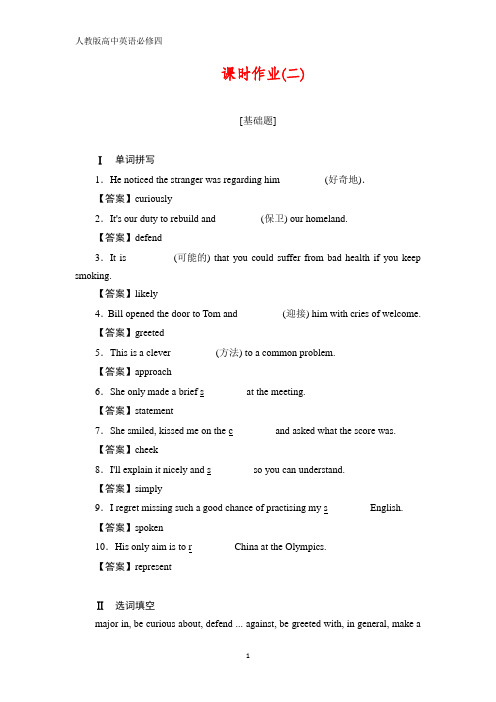
课时作业(二)[基础题]Ⅰ单词拼写1.He noticed the stranger was regarding him ________ (好奇地).【答案】curiously2.It's our duty to rebuild and ________ (保卫) our homeland.【答案】defend3.It is ________ (可能的) that you could suffer from bad health if you keep smoking.【答案】likely4.Bill opened the door to Tom and ________ (迎接) him with cries of welcome.【答案】greeted5.This is a clever ________ (方法) to a common problem.【答案】approach6.She only made a brief s________ at the meeting.【答案】statement7.She smiled, kissed me on the c________ and asked what the score was.【答案】cheek8.I'll explain it nicely and s________ so you can understand.【答案】simply9.I regret missing such a good chance of practising my s________ English.【答案】spoken10.His only aim is to r________ China at the Olympics.【答案】representⅡ选词填空major in, be curious about, defend ... against, be greeted with, in general, make astatement, associate with, as if, be likely to, communicate with1.Younger children ________ how things work, and many of them want to take apart everything within their reach.【答案】are curious about2.Her speech ________ cheering.【答案】was greeted with3.The president ________ to the press last Saturday.【答案】made a statement4.People usually ________ China ________ the Great Wall.【答案】associate; with5.He ________ get what he wants.【答案】is likely to6.Peter can be really difficult at times even though he's a nice person ________.【答案】in general7.All our officers are trained to ________ themselves ________ knife attacks.【答案】defend; against8.My younger brother ________ French at university.【答案】majors/majored in9.He talked all the while excitedly, ________ to himself.【答案】as if10.Parents should ________ their children.【答案】communicate withⅢ单句语法填空1.He is likely ________ (star) in the film directed by his brother.【答案】to star2.She can't misunderstand you, ________ can I.【答案】nor3.Unless there's evidence ________ the contrary, we ought to believe him.【答案】to4.The ________ (major) of villagers took up arms to defend themselves.【答案】majority5.With winter ________ (approach), it's getting colder and colder by the day.【答案】approaching6.They are working in ________ (associate) with a company to help the disabled.【答案】association7.As soon as he got out of the car, he went straight into the hall without ________ (greet) anyone.【答案】greeting8.________ (general) speaking, women can expect to live six or seven years more than men.【答案】Generally9.Children often ask strange questions ________ of curiosity.【答案】out10.The performer opened the drawer, ________ if in search of something important.【答案】as[能力题]阅读理解ADuring a visit to Australia, former President George W. Bush tried to signal a peace sign by waving the two fingers or V-sign at the crowd. You may think of this as a simple gesture, but he made a big mistake. Instead of his palm facing outwards, it faced inwards. In Australia, it means “go to hell”!Therefore, it is very important to understand the meanings of hand gestures in different cultures before you travel to different countries.续表1.The writer mentioned George W.Bush in Paragraph 1 in order to ________. A.prove everyone can use wrong hand gesturesB.tell us the importance of world peaceC.lead to the topic of the passageD.introduce a peace sign【答案】C推理判断题。
Unit4Languagepoint课件人教版高中英语选择性必修第四册

【应用实践】 ①Hearing the news, she was dying __B_______ her husband on passing the driving test. A. for concentrating B. to concentrate C. to be concentrated D. to concentrating ② The staff are dying _f_o_r___ a chance to go to the shore annually. ③ The child can’t wait to return to school because he is thirsty _fo_r_ knowledge.
6.to be honest
____说__实___在__的________
7.make a difference to ____对__._.__._有__重___大__影__响
8.participate in 9.upside down
____参__加_____________ ___上___下__颠__倒_________
(different).
3. be relevant to
(1) Sometimes I wonder how relevant chemistry is to these students — few will ever become chemists—and most will be going back to their villages after Year 8 anyway. 有时 候,我真想知道,化学对这些学生究竟有多大用处,很少有人会成为化学家,并且他们 中的大多数人学完八年级以后就要回到他们的村庄去了。 (2) I don’t think what he said is related to the topic we are discussing. He has missed the point.我觉得他说的和我们正在讨论的话题不相关。他已经跑题了。 (3) The film has relevance to what is being discussed in class.这部电影与课堂上正在讨论 的事情有关。
人教版book4u4知识点(学生版)必修四 Unit 1 Women of achievement

B4U1 Women of achievement Language points核心单词1. achievement n.[C]成就;功绩;\[U\]实现;完成;达到联想拓展achieve v.取得,实现achieve an aim/a goal达到目标achieve success 获得成功He received the Nobel Prize for his scientific achievements. 他因科学上取得的成就而获得诺贝尔奖。
Flying across the Atlantic for the first time was a great achievement. 首次飞越大西洋是一个伟大的功绩。
高手过招完成句子①没有人民的支持,我们将一事无成。
Without the support of the people we can .②我只完成了我所希望完成的工作的一半。
I have achieved only half of I hope to do.③祝贺你获得这样完美的胜利。
Congratulations to you (介词) such a complete victory.2. behave vi.举止,行为,表现;(机器等)工作,运转(常与well/badly等副词连用)vt.守规矩;举止有礼常用结构:behave oneself 使某人自己举止规矩Behave yourself; don’t make a fool of yourself. 注意你的举止, 别闹出笑话来。
How is your new car behaving? 你的新车性能如何?联想拓展behaviour n. (人的)言行举止,行为;(动物)习性,自学成才behaviour towards/to... 对……的态度/行为高手过招(1)单项填空①David is quite well in school. He obeys the teachers and gets As in all his subjects. (2009山东潍坊检测)A. behavedB. concernedC. involvedD. respected(2)完成句子①父母让孩子们在客人面前举止礼貌。
高中英语人教版必修四单元教案:Unit4BodyLanguage
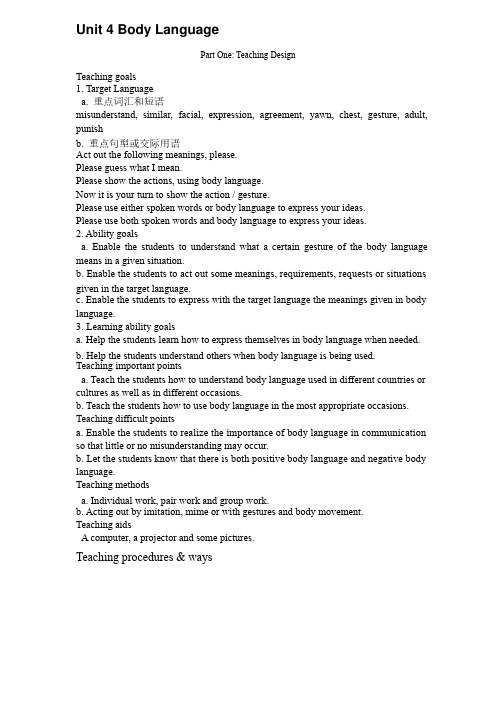
Unit 4 Body LanguagePart One: Teaching DesignTeaching goals1. Target Languagea. 重点词汇和短语重点词汇和短语misunderstand, similar, facial, expression, agreement, yawn, chest, gesture, adult, punishb. 重点句型或交际用语重点句型或交际用语Act out the following meanings, please.Please guess what I mean.Please show the actions, using body language.Now it is your turn to show the action / gesture.Please use either spoken words or body language to express your ideas.Please use both spoken words and body language to express your ideas.2. Ability goalsa. Enable the students to understand what a certain gesture of the body language means in a given situation.b. Enable the students to act out some meanings, requirements, requests or situations given in the target language.c. Enable the students to express with the target language the meanings given in body language.3. Learning ability goalsa. Help the students learn how to express themselves in body language when needed.b. Help the students understand others when body language is being used.Teaching important pointsa. Teach the students how to understand body language used in different countries or cultures as well as in different occasions.b. Teach the students how to use body language in the most appropriate occasions. Teaching difficult pointsa. Enable the students to realize the importance of body language in communication so that little or no misunderstanding may occur.b. Let the students know that there is both positive body language and negative body language.Teaching methodsa. Individual work, pair work and group work.b. Acting out by imitation, mime or with gestures and body movement.Teaching aidsA computer, a projector and some pictures.Teaching procedures & waysThe first period reading(COMMUNICATION: NO PROBLEM?)AimsTo help students develop their reading ability.To help students learn about body language.ProceduresI. Warming upWarming up by actingLook at the list of interpretation on the right side of the chart. Perform the action or the nonverbal behaviour on the left side.Examples Of Body LanguageWarming up by defining—What is body language?II. Pre-reading1. Looking and sayingLook at the man in the picture below. What does he say to you by his body language?Basically, how the ...... do I know? Or, I don’t know nothin! The shoulders are hunched and the hands are open signifying a big question mark.2. Talking and sharingBody language is the quiet, secret and most powerful language of all!According to experts, our non-verbal language communicates about 50% of what we really mean (voice tonality contributes 38%) while words themselves contribute a mere 7%.Our bodies send out messages constantly and often we don't recognize that we're communicating a lot more than we realize.Our understanding and use of non-verbal cues in facial expression are familiar to us nearly from birthIII. Reading1. Reading aloud to the recordingNow please listen and read aloud to the recording of the text COMMUNICATION: NO PROBLEM?. Pay attention to the pronunciation of each word and the pauses within each sentence. I will play the tape twice and you shall read aloud twice, too.2. Reading and underliningNext you are to read and underline all the useful expressions or collocations in the passage. Copy them to your notebook after class as homework.3. Reading to identify the topic sentence of each paragraphNext you are to skim the text to identify the topic sentence of each paragraph.4. Reading and transferring informationRead the text again to complete the table. Where is he/ she from? What does he/ she do when he/ she meet someone at the airport for the first time?Name Country Action MeaningMr GarciaJulia SmithAhmed AzizMadame Coulon5. Reading and understanding difficult sentencesAs you have read the text times, you can surely tell which sentences are difficult to understand. Now put your questions concerning the difficult points to me the teacher.6. Reading and translatingNow it’s time to translate the text into Chinese, sentence by sentence. Who will be the first to d o it?IV. Closing downClosing down by doing exercisesTo end the lesson you are to do the comprehending exercises No. 1 and 2 on page 26 and 27.Closing down by checkingC heck some of the following basic non-verbal cues and you'll recognize that you already speak and translate much of the language.“I’m surprised!” I’m shocked!” “I’m sad!”The second period Learning about Language(The ~ing form as the Attribute & Adverbial)I. Warming upWarming up by discovering useful words and expressionsTurn to page 27 and do exercises No. 1, 2 ,3 and 4 first. Check your answers against your classmates’.II. Learning about grammar1. Reading and thinkingTurn to page 25 and read with me the text of COMMUNICATION: NO PROBLEM? As you read along, pay attention to the uses of The ~ing form as the Attribute & Adverbial. (They are visitors coming from several countries. 作定语;Four people enter looking around in a curious way. 作状语;作状语; This is an exciting experience for you. 作定语; You stand watching and listening. 作状语;……)2. Doing exercises No. 1 and 2 on page 29Turn to page 29. Do exercises No. 1 and 2。
2019新人教高中英语选择性必修四Unit4Sharing-Using Language公开课教案
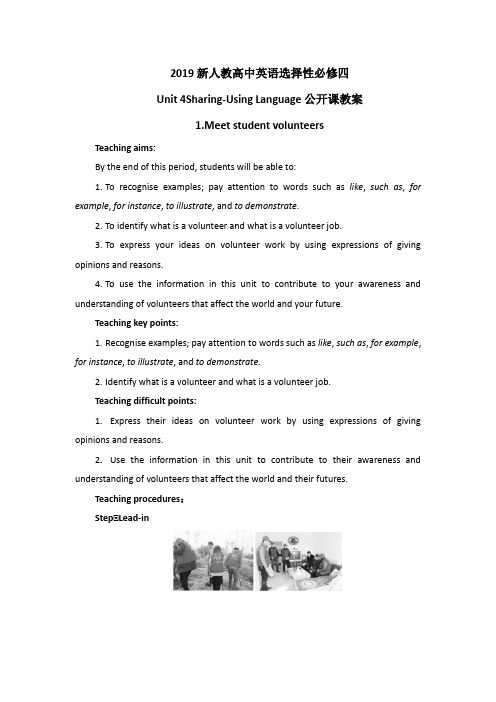
2019新人教高中英语选择性必修四Unit 4Sharing-Using Language公开课教案1.Meet student volunteersTeaching aims:By the end of this period, students will be able to:1.To recognise examples; pay attention to words such as like, such as, for example, for instance, to illustrate, and to demonstrate.2.To identify what is a volunteer and what is a volunteer job.3.To express your ideas on volunteer work by using expressions of giving opinions and reasons.4.To use the information in this unit to contribute to your awareness and understanding of volunteers that affect the world and your future.Teaching key points:1.Recognise examples; pay attention to words such as like, such as, for example, for instance, to illustrate, and to demonstrate.2.Identify what is a volunteer and what is a volunteer job.Teaching difficult points:1.Express their ideas on volunteer work by using expressions of giving opinions and reasons.e the information in this unit to contribute to their awareness and understanding of volunteers that affect the world and their futures.Teaching procedures:StepⅠLead-in1.What can you see in the photos?2.What are they doing?Design:T:Dear students, look at these photos please. What information can you get from these pictures? What are they doing?Ss:They are helping others. They are picking rubbish.T:Yes, so have you ever been a volunteer?Ss:Yes/No, but I always want to be a volunteer and help others.Suggested answers:1.Some people are doing volunteer work.2.They are planting trees.They are visiting community residents.They are cleaning streets.They are taking care of the elderly.StepⅠPre-listeningActivity1Group discussion and fill in the chart.1.Did you participate in a volunteer project before? Or are there any volunteer stories you would like to share?2.What’s the purpose of the volunteer project? Where did you go? What did you do?Purpose Place ActivityTo clean the neighbourhood...In thecommunity...To pick uprubbish...1.①Yes, I have helped direct traffic in the road with my classmates.②No, I have never been a volunteer.2.略Activity2Guess the content of the listening material.They will probably be talking about being a volunteer. For example, thedefinition of “volunteer”, and the activities they do as a volunteer.StepⅠWhile-listeningActivity1First listening.Listen to the conversation and get to know the main idea.Activity2Second listening.Listen to the conversation again and complete the table below.Suggested answers:poor students; clean up the community ;the elderly peoplemoney to give to a different charity; food to homeless people;a children’s hospitalcontact a children’s hospital and ask how they could helpActivity3Third listening.Listen to the conversation again and complete the sentences.•Perhaps we could organise donations of things for poor students.•Wouldn’t it be better if we did something different this year, ?•Every year, our whole school raises money to give to a different charity. to a medical charity last year, and to an education charity before that.Suggested answers:•such as pens and notebooks, or other school supplies•like organising students to volunteer their time•For instance, we donatedActivity4Fourth listening.Listen again and discuss the questions. The expressions in the box may help you.1.Do you think students doing volunteer work is of any use?Why or why not?2.In your opinion, which is better,giving people things , time, or money? Why do you think so?StepⅠ Post-listeningActivity1Read the listening material carefully.Tony:Hi! Is this the meeting for student volunteers?Wang Li:Hi, Tony! Yes, it is!Tony:Oh, hi, Wang Li! I used to volunteer at my high school in America, so I wanted to try it here in China.Peipei:We’re glad you’re here! Our meeting today is to talk about what kind of volunteer project we should do this term.Wang Li:Peipei,may I suggest that we do something for schools in poor areas? Perhaps we could organise donations of things such as pens and notebooks, or other school supplies for poor students.Peipei:Good idea, but we did that last year. Wouldn’t it be better if we did something different this year, like organising students to volunteer their time?Wang Li: Like what?Peipei:Well, like cleaning up the community, taking down ads from walls, and picking up litter. It might be a good idea to contact the community office and ask how we can help. Do you guys have any other ideas?Wang Li:How about writing to some nursing homes to see if they need someone to spend time with the elderly people? We can play games, sing, or just chat!Tony:That sounds like one of my school’s volunteer projects.Wang Li:Really? What other volunteer projects does your school take part in?Tony:Oh, all kinds. Every year, our whole school raises money to give to a different charity. For instance, we donated to a medical charity last year, and to an education charity before that. We raise money in different ways, such as by making and selling things, or holding a marathon and asking people to promise to donate for every kilometer we run. We also have weekly volunteer groups.Peipei:That sounds interesting! What do the groups do?Tony:Well, on Fridays, there are student volunteers who help serve food to homeless people. And on Saturday mornings, a group of students go to a children’s hospital to cheer up all the little kids there.Wang Li:Hey, I was also thinking we could contact a children’s hospital and ask how we could help. How does that idea sound, Peipei?Peipei:I love that idea! Thanks, Tony and Wang Li!Tony:No problem, I’m glad to help. Volunteering is something we should all do.Activity2Role-play.Four students as a group and one is the journalist, other three students are in the same volunteer activity.Make up a dialogue about volunteer work, using the common expressions.Function ExpressionsGiving suggestions May I suggest that we...?Perhaps we could... Wouldn’t it be better if...,like...? It might be a good idea to... How about ...?I was also thinking...Giving responses Good idea, but...Like what?That sounds like... That sounds interesting.I love that idea!2.Make a speech about China’s aid to other countriesTeaching aims:By the end of this period, students will be able to:1.Understand Zhang Bingbing’s speech in the English speech contest, and understand the structure and language characteristics of the speech.2.Be able to write a speech on the topic of China’s aid to other countries.3.Establish a correct outlook on life.Teaching key points:1.Guide students to read the article and understand the author’s rhetorical technique using rhetorical questions.2.Guide students to give a speech on China’s aid to other countries.Teaching difficult points:1.Guide students to read the article and write a speech on China’s aid to other countries.2.Guide students to understand the author’s rhetorical device using rhetorical questions.Teaching procedures:StepⅠLead-in(Before reading)Look at the video and answer the question:During the outbreak of COVID-19, China has been providing help to many countries.Do you know any other countries China has helped?Suggested answers:The answers may vary.StepⅠWhile-readingRead the speech transcript and answer the following questions.1.What are some examples of the work that Chinese people do to help others overseas?2.Why was Bingbing upset when her mother went to Tanzania?3.What are some of the problems people face in Tanzania?4.What are two things that Bingbing’s mother is helping with?5.Why is this work worth it?Suggested answers:1.We see Chinese workers building roads in the Congo, a port in Pakistan, railways in Panama, and an airport in Sri Lanka.And we see Chinese miners, oil workers, agricultural experts, mechanics, and doctors working in nearly every corner of the world.2.Because she was her best friend.They talked together, they spent their leisure time together, and except for school and work, they were never apart.Her leaving meant that they could not spend time together.3.They are facing many health problems such as dangerous diseases and the lack of cardiac hospital.4.One project that her mother worked on was helping to build a cardiac hospital.Her mother also does a circuit of the rural villages to provide medical treatment.5.Because it shows that we are global citizens interested in world stability, and that we feel responsible for others and are ready to build a community with a shared future for mankind.Everyone deserves a fair chance in life.StepⅠAnalysing: Analyse the features of the speechActivity1Read the speech transcript and answer the question by filling in the blanks below.What’s the main idea of the speech?The speech is about Chinese people .The writer believes that her mother is working as a in Tanzania, Africa.Suggested answers:volunteering in other countries; worth; volunteer consultantActivity2Figure out the structure of the speech.Suggested answers:Activity3Study the features of the speech to answer the following questions.1.What is the key rhetorical question used in this speech?2.What is the answer to this rhetorical question?3.What does the speaker use to get her message across?a case study a hypothetical examplea joke a personal storyan analysis of the history and causes of the issuefacts and data4.How did Bingbing’s feelings about the topic change, and what caused this change?5.How does the speech end?Suggested answers:1.Is her work worth it?2.Yes,to the lives of the people she is helping,it is worth it.But by any criteria this work is worth it to us as well,because it shows that we are global citizens interested in world stability,and that we feel responsible for others and are ready to build a community with a shared future for mankind.e a personal story to get her message across: her feelings about her mother’s work.4.Her feelings about the topic changed when she knew the differences her mother and the volunteers e a rhetorical question and provide the answer immediately to restate the point.5.End the speech with a declaration and a call to action.Activity4Summarise the structure and the useful expressions.StepⅠWritingWrite a speech about China’s aid to other countries.Step 1: In groups, brainstorm a list of possible causes that you could talk about.Step 2: In pairs, go over the list and discuss these points:·Which,if any,of the causes do you have a personal connection with?·What personal story could you tell in relation to that cause?·How did that affect your opinions on the issue?·What rhetorical question could you use to begin your speech?·What is the answer to that rhetorical question?·What action do you want people to take as a result of your speech?Step 3: Using what you have discussed, write a short speech.Tips:·You can use rhetorical question to begin your speech.·You can use the following materials to get your message across.a case study a hypothetical examplea joke a personal storyan analysis of the history and causes of the issuefacts and dataYou can end your speech with a declaration or/and a call to action.Step 4:Exchange your draft with a partner and revise the draft using your partner’s comments.Step 5:Present your speech and listen to your classmates’ speeches.As a class, vote on the best one.Suggested answer:Dear comrades who are going to aid Africa:Hello everyone!Our first medical team to aid Africa is about to depart, and I can’t help but think of the words in the Who Is the Loveliest Person:“How beautiful and broad their souls are.”This sentence is dedicated to those volunteer soldiers. Today, I want to give it to ourselves—we are volunteers and heroes of the “Africa Aid” medical team, and weare all the cutest people!The COVID-19 struck the earth. Not only our homeland is suffering from it, but also our distant brother, Africa. So far,many African countries have confirmed cases. If we can’t offer assistance in time, it’s hard to imagine what the situation will be in Africa, where conditions are relatively backward in all aspects! The silent drums of war are beating in my heart.Everyone’s passion has been ignited, and the heroes of “Africa Aid” are ready to take steps!Why do we need to aid Africa?Because we know that the “Africa Aid ” action represents China’s great love.Only by working together in the same boat can we spend the winter of the epidemic.And we will help each other to overcome the difficulty.StepⅠ Homework一个小小的善意,可能会改变人的一生。
高中英语 Book4 Unit4body language 说课课件 新人教必修4(通用)
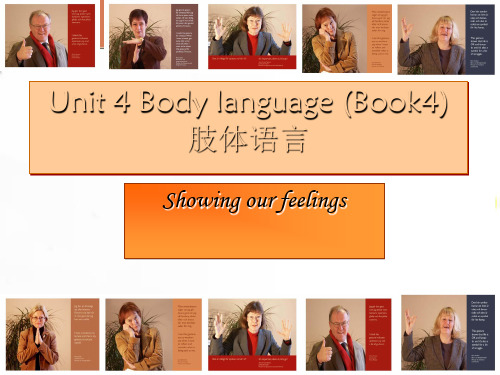
1). Analysis of the teaching material 教材分析
The type of this class is an extensive reading class, which plays an important part in developing students’ reading ability. So,during the teaching process, the teacher should focus on developing the students’s reading ability by extensive reading, and get them to learn some reading skills such as skimming, scanning and so on. Moreover, the students should receive some moral education, let them know more about body language in cultures in different countries.
课前探索(Pre-class Exploration):
Let students search for more information about body language which shows different meanings in different cultures and countries.
掌握该部分的重点词句
3.Let students read and understand the passage “Showing our feelings”.
让学生读懂本篇文章
Teaching difficult points (教学难点)
英语人教版必修4学案:Unit 4 Section Ⅱ Warming Up Reading Language Points含解析
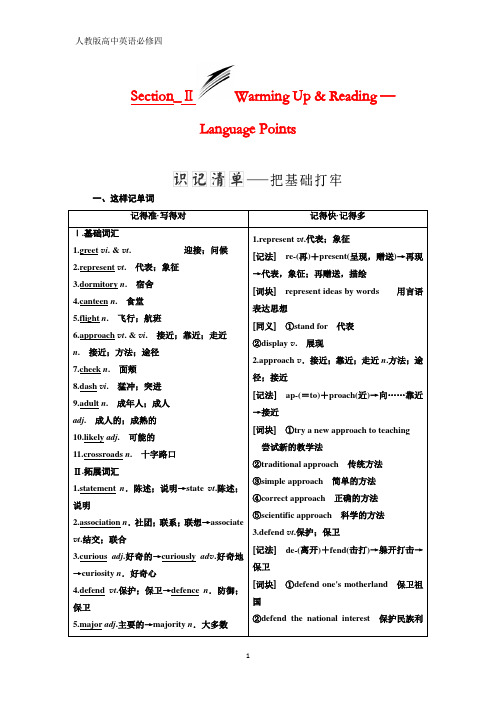
Section_ⅡWarming Up & Reading —Language Points一、这样记单词记得准·写得对记得快·记得多Ⅰ.基础词汇1.greet v i. & v t.迎接;问候2.represent v t. 代表;象征3.dormitory n. 宿舍4.canteen n. 食堂5.flight n. 飞行;航班6.approach v t. & v i. 接近;靠近;走近n. 接近;方法;途径7.cheek n. 面颊8.dash v i. 猛冲;突进9.adult n. 成年人;成人adj. 成人的;成熟的10.likely adj. 可能的11.crossroads n. 十字路口Ⅱ.拓展词汇1.statement n.陈述;说明→state v t.陈述;说明2.association n.社团;联系;联想→associate v t.结交;联合3.curious adj.好奇的→curiously ad v.好奇地→curiosity n.好奇心4.defend v t.保护;保卫→defence n.防御;保卫5.major adj.主要的→majority n.大多数1.represent v t.代表;象征[记法]re-(再)+present(呈现,赠送)→再现→代表,象征;再赠送,描绘[词块]represent ideas by words用言语表达思想[同义]①stand for 代表②display v. 展现2.approach v.接近;靠近;走近n.方法;途径;接近[记法]ap-(=to)+proach(近)→向……靠近→接近[词块]①try a new approach to teaching 尝试新的教学法②traditional approach 传统方法③simple approach 简单的方法④correct approach 正确的方法⑤scientific approach 科学的方法3.defend v t.保护;保卫[记法]de-(离开)+fend(击打)→躲开打击→保卫[词块]①defend one's motherland 保卫祖国②defend the national interest 保护民族利was TonyGarcia fromColombia, closely followed by Julia Smith from Britain. 第一个到达的人是来自哥伦比亚的托尼·加西亚,随后紧跟着的是来自英国的朱莉娅·史密斯。
新课标人教版必修四Book4 Unit1 Language points
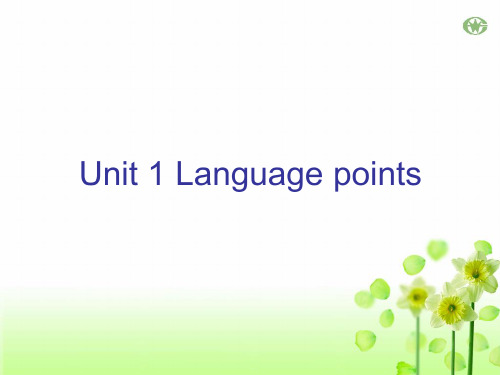
[即境活用1] (1)______a mobile phone can you ring ______ you want to talk with anywhere. A.Using; whoever
B.Only on; whomever
C.Only by; whatever D.With; anyone (2)Only by following this method ______. A.we can study English well B.can we be able to study English well
Unit 1 Language points
1. support
2. look down upon/on
3. devote …to
支持 蔑视;瞧不起 把…奉献给;致力于 继续;坚持
4. carry on
5. inspire 6. catch one’s eye 7. lead a … life 8. deliver 9. observe 10. argue
C.served
D.regarded
10.Is it ______ sparing some time for your hobby while your classmates are concentrating on
their lessons?
A.worth C.worthwhile B.worthy D.valuable
12.______ he dropped out of school? -His family had run into financial difficulties. A.Why was it that B.Why was that
(完整版)人教版高一英语必修四unit4Bodylanguage教案

人教版高一英语必修四unit4 Body language教案Part 1.Teaching goals: 教学目标1. 语言能力目标●Talk about body language: cultural differences andimprove the students’ reading ability, such as skimming, scanning,get the detailed information and understand the main idea of the text.●让学生通过阅读,能够理解并尊重不同区域的人的身体语言和其文化涵义。
●进一步训练学生推测、略读、找读、归纳内容等阅读技巧;培养学生把握篇章中心内容、归纳段落大意、获取关键信息、并且能针对阅读内容表达自己的观点的能力。
3. 情感态度目标●要学生明白身势语是不同文化的载体,在跨文化交际中起到非常重要的作用,了解肢体语言在不同含义,可以帮助学生在日常的交际中正确的注意和使用自己的体态,姿势,面部表情等,正确的理解和运用肢体语言,达到良好的交际效果。
●Body language is actions that human beings canexpress themselves and communicate with otherswithout words, with which people can avoiddifficulties when they fully understand the bodylanguage when they communicate with others. Bodylanguage plays important roles in communicating.Part 2.Teaching Important and difficult Points●重点词汇与短语greet prediction represent association dormitory canteen flight curious curiouly Colombia approach cheek defend defence major misunderstanding Jordan dash adult spoken Spain Italy likely crossroadsdefend against be likely to in general●重点句子结构与用法Yesterday, another student and I, representing our university’s student association, went to …After half an hour of waiting for their flight to arrive, I saw several young people enter the waiting area looking around curiously.I stood for a minute watching them and then went to greet them.She stepped back appearing surprised and put up her hands, as if in defence.Then Akira Nagata from Japan came in smiling, together with Japanese student.When Darlene Coulon from France came dashing through the door, she recognized Tony Garcia’s smiling face.3.Improve the students’ reading ability, such as skimming, scanning,get the detailed information and understand the main idea of the text.4.let students learn about the words and expressions about body language.Part 2. Teaching Important Points:1.Teach the students how to understand body language used in different countries or cultures as well as in different occasions.2. How does body language differ among people fromdifferent cultures?Part 3. Teaching Difficult Points:1. Let the students know that there is both positive body language and negative body language.2.to grasp the main idea of the text.Part 4.Teaching Methods:。
2019新人教高中英语选择性必修四Unit4Learning about Language公开课教案
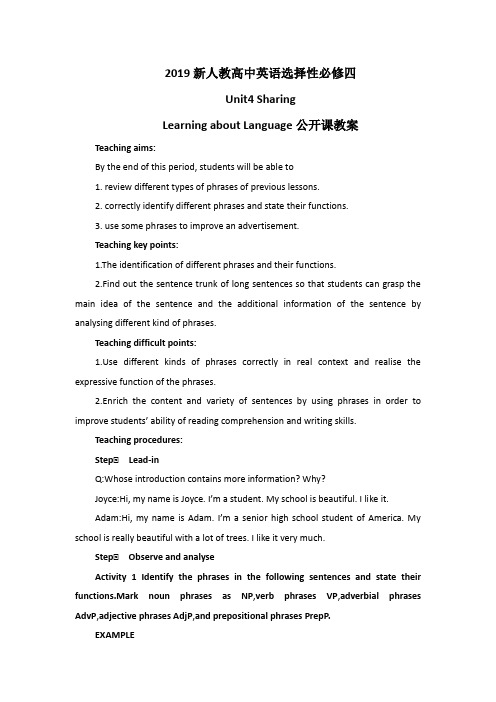
2019新人教高中英语选择性必修四Unit4 SharingLearning about Language公开课教案Teaching aims:By the end of this period, students will be able to1. review different types of phrases of previous lessons.2. correctly identify different phrases and state their functions.3. use some phrases to improve an advertisement.Teaching key points:1.The identification of different phrases and their functions.2.Find out the sentence trunk of long sentences so that students can grasp the main idea of the sentence and the additional information of the sentence by analysing different kind of phrases.Teaching difficult points:e different kinds of phrases correctly in real context and realise the expressive function of the phrases.2.Enrich the content and variety of sentences by using phrases in order to improve students’ ability of reading comprehension and writing skills.Teaching procedures:StepⅠ Lead-inQ:Whose introduction contains more information? Why?Joyce:Hi, my name is Joyce. I’m a student. My school is beautiful. I like it.Adam:Hi, my name is Adam. I’m a senior high school student of America. My school is really beautiful with a lot of trees. I like it very much.StepⅠObserve and analyseActivity1Identify the phrases in the following sentences and state their functions.Mark noun phrases as NP,verb phrases VP,adverbial phrases AdvP,adjective phrases AdjP,and prepositional phrases PrepP.EXAMPLEMy secondary school NP (subject)is a bush school.NP (predicative)1.I’ve been dying to have some of my favourite sweets,and it’s always nice to get mail!2.The mixture was bubbling out of the test tube spilling everywhere!3.Tombe’s father,Mukap,a man with a strong jaw and a wrinkled forehead,led us to his house.4.He then placed the hot stones in an empty oil drum with kau kau(sweet potato),ripe corn,and greens.ter,I noticed a can standing upside down on the grill over the fire.6.My muscles were aching and my knees shaking as we dragged ourselves down the mountain towards home.Suggested answers:1.I’ve been dying toVP(predicate)have some of my favourite sweetsNP(object),and it’s always niceAdjP(predicative)toget mailVP(real subject)!2.The mixture NP(subject)was bubbling outVP(predicate)of the test tubeNP(object)spilling everywhereAdvP(adverbial)!3.Tombe’s fatherNP(subject),Mukap,a manNP(appositive)witha strong jaw and a wrinkled foreheadPrepP(attributive),led usVP(predicate)to his housePrepP (adverbial).4.He then placedthe hot stones NP(object)in an empty oil drumPrepP(adverbial)withkau kau(sweet potato),ripe corn,and greensPrepP(attributive).ter,I noticed a canNP(object)standingupside down AdvP(adverbial)onthe grillPrepP(adverbial)overthe firePrepP(adverbial).6.My musclesNP(subject)were achingVP(predicate)and my kneesNP(subject)shaking as wedragged ourselves VP(predicate)downthe mountainAdvP(adverbial)towardshomePrepP(adverbial).Activity2Complete the following table.Suggested answers:StepⅠPracticeActivity1Background information.Q:When was the idea of the Belt and Road Initiative first put forward?What kind of projects does it carry out?What is the purpose of the Belt and Road Initiative?Suggested answers:Q:When was the idea of the Belt and Road Initiative first put forward? (In 2013.) What kind of projects does it carry out? (Economic cooperation and cultural communication, such as building roads and railways, volunteer work in education and healthcare.)What is the purpose of the Belt and Road Initiative? ( The purpose of the Belt and Road Initiative is a win-win for all.)Activity2Complete the passage with the phrases below in their proper forms.China has offered to many countries in its Belt and Road Initiative. In the Congo, many have been transformed into since then. Trains run Europe from China, and to China from Europe, bringing new jobs and opportunities to both ends. Chinese healthcare workers have also been sent to provide aid to places . Despite all the difficulties involved in this project, these efforts have been greeted with support from the locals.Suggested answers;China has offered a large amount of investment to many countries in its Belt and Road Initiative. In the Congo, many dusty tracks have been transformed into beautiful modern roads since then. Trains run straight towards Europe from China, and to China from Europe, bringing new jobs and opportunities to both ends. Chinese healthcare workers have also been sent to provide aid to places with dangerous disease. Despite all the difficulties involved in this project, these efforts have been greeted with a chorus of support from the locals.StepⅠLanguage use and shareImprove an advertisement to make it more exciting.Improving Health in GuineaIn order to ease suffering in Guinea,volunteers are needed to provide healthcare information.As a volunteer,you will be responsible for organising lectures,preparing posters,and visiting schools and families.There is no doubt that these activities will leave you with unforgettable memories.The program will last for one year or more,depending on your performance.You need to be over 18 and able to communicate in English.You don’t need to have overseas experience,but you should be friendly and outgoing.If you are interested in volunteering,please speak to our representative online.Suggested answers:In order to ease suffering in Guinea from a lack of doctors and good healthcare advice,volunteers with a heart to help others are needed to provide healthcare information to people in rural villages.As a volunteer,you will be responsible for organising lectures,preparing posters,and visiting schools and families throughout the southern part of the nation.There is no doubt that these activities will leave you with unforgettable memories for the rest of your life.The program will last for one year or more, depending on your performance.You need to be over 18 and able to communicate well both in spoken and written English(or in French).You don’t need to have overseas experience,but you should be friendly and outgoing with a wonderful smile.If you are interested in volunteering,please speak to our representative online.StepⅠPracticeⅠ.请写出下列画线短语的类型及所充当的成分1.He could only understand a word here and there.2.Don’t fall for(=Don’t be attracted by) her beauty.3.In spite of the difficulties,we went on with our work.4.We need to build a factory twice larger than this one.5.She carried a basket full of eggs to visit her grandmother.6.New office buildings are going up/are built everywhere.7.The letter on the desk is for Mr Wu,our department manager.8.He was so hungry that he finished off everything on the table.9.He has been working here as an assistant to chairman for ten years.10.We found everything in the lab in good order before doing experiment.Ⅰ.语法填空(以介词为主)My husband and I were paying a visit to my parents 1.Tucson.We went to a fast-food restaurant 2.dinner together. My husband went to the counter to order dishes and I stood 3.my parents.My dad is 90 years old. He can hardly see very well and walks with a stick.I was scanning the restaurant,waiting to sit 4.the first table that was more convenient than others.A woman who was sitting with her son made eye contact with me and asked me to come to her.5. a puzzled look 6.my face,I pointed to myself and said,“Me?” She nodded and said,“Yes,you.”I walked to the table and she said,“Bring your family here.I can finish eating 7.the counter. My son is 8. a hurry to leave anyway.” My eyes were filled with tears as she wiped down the table and guided my dad to the seat.I always believe that there are naturally kind people 9.this world.This woman has set a good example 10.her son,who is a really lucky guy.Ⅰ.单句写作1.政府向失业者分发食品。
Unit4词汇复习与检测学案-高中英语人教版选择性必修第四册

人教版2019词汇复习与检测选择性必修四Unit 4学案Learning aims and demandsTo master the language points and use them freelyStep 1 Self-review and guidingI、词汇考查1..parcel ['pa:slj: n.包裹(UK) vt.裹好;打包(parceiled/parceled — parcel 1ing/parceling)package: n.包裹(US)parcel up:把什么包起来/打包pack up:打行李包;收拾行李jam [dgaem]: n.果酱;堵塞麻烦v.塞满,挤满a traffic jam:交通堵塞;堵车get into a jam :陷入困境;He jammed four apples in his pocket.他把四个苹果塞进口袋。
2.mail [mei]: n.邮件;信件;邮政(美国常用)vt.邮寄;发电邮给mailbox n.邮箱mailman n.邮递员post: n.邮政;邮递;邮寄;邮件(英国常用)v.寄;邮寄;投递secondary['sekondri]: adj.中学的;次要的second n.秒(时间单位)v.(决斗等中)当……的助手Clay animation黏土动画;粘土动画Clay soil retains water.黏土能保持水分。
42.criterion [kralterisn]: n. (pl. criteria [-ria ])(评判或作决定的)标准;准贝上原则phenomenon(复phenomena): n. 现象[fa'numnan] [fa'nnmna]standard [ fetsendod] :n.标准principle [ *prnspl]: n.原则;准则;规范H.单词拼写Their car was caught in a traffic(堵塞),thus causing the delay.1.The on the premier's face suggest that he is no longer young.2.I am to have a chance to share my experience with all of you.3.She will take great pride in wearing school to stand for her school.4.His parents always had him the garden and carrying out the garbage.5.Disabled as I was in language, I could still express myself with(黏土).6.Water is usually warmer in direct sunlight than in the.(阴凉处)We were disappointed that they insisted on such a(死板的)explanation of therules.9.It takes me only a few minutes to walk to school down a(布满灰尘的)trackcovered in weeds.lO.His nationality is not(有关的)to whether he is a good singer.in.单句语法填空There was a time when many young people were dying(go) abroad.1.It is said that only members have the privilege(use) the submersible.2. 1 casually(mention) that I might be interested in working abroad.3.For the concert, he dusted some of his hits.4.He hid himself behind the door, fromhe saw the man take something on thedesk.5.The manned tram lost control and slipped down the hill(drag) the horses with it.6.It is said that the chairwoman comes from a(privilege) background.7.Don't leave the bread on the table after it was bought from bakery; it will dry.8.What you said has no(relevant) to the subject.9.The match finally came to life in the(secondary) half.IV、语法填空One day, I was comfortably waiting for my flight with a good book to read when1.elderly lady wheeled to our waiting area.I noticed the trouble she was having2.(try) to open a packet of nuts with her shaking hands.No one else was willing to meet her gaze(目光),so I3.(offer) to help.The lady was very grateful.We sat and chatted.The time came to board the plane.She could walk but needed some4.(assist), so I volunteered to help her and carry her bag.As I helped her get 5.(settle), I noticed her “seat male”, a businessman, looked a bit horrified at having to make the flight with her.He offered to change 6. (seat) with me-and I agreed.We had a long chat.As we were entering another country, we needed to fill out forms.I offered to fill 7.(her) out because of her shaking hands.We landed and I needed to change planes, but I helped her first.The wheelchair she ordered was nowhere to be seen so we slowly walked to the gate 8. her daughter was waiting.As a result, I had to run to catch my connection but, as I thought about the experience, I saw her 9.my airport angel, a chance for me to hope that in the future when I'm in my eighties and traveling, someone will take the time 10. (connect) with me.n.单词拼写l.jam 2.wrinkles 3.privileged 4.uniform 5.weeding6.clay7. shade8. rigid9. dusty 1(). relevantin.单句语法填空1.to go2.to use3.mentioned4.off5.where6.dragging7.privileged8.out9.relevancelO.secondIV.语法填空1. an 2. trying 3. offered 4. assistance 5. settled6. seats7. hers8. where9. as 10. to connectHomeworkTo recite the language points and the key sentences .adj.第二的;第二次的adv.以第二名Secondly adv.其次;(用于列举)第二;secondary school:中学primary school:小学['pramari]secondary teacher/education:中学教师/中等教育be secondary to...:第二的;次要的;次于…pray [pre|: vi. &vt.企盼;祈祷prayer [prea(r)]: n. 祷告;祈祷pray for peace/sb:祈求和平/为某人祈祷pray that +句子:但愿dust [d,M: n.沙土;灰尘vi./vt.擦灰dusty ['dASti]: adj.布满灰尘的a dusty answ6r (对要求的)轻率的回绝;淡然的拒绝not so dusty还好;还不坏dust sb. down/off将尘土从某人身上抹去或拂去dust sth. off开始复习某事(尤指一段时间内搁置不用的技艺或语言)dustbin n.垃圾箱5.weed [wi:d]: n.杂草;野草(C.) vt. & vi.除杂草weed out清除,消失weedy adj.似杂草的,瘦弱的grass: n.草;青草;牧草(U.)seaweed: n.海带;海草;海藻(U.)chorus Pkoiros]: n.合唱曲;合唱团(常用于具体的名称)vt.合唱;齐声说a chorus of:齐声;异口同声choir [ 'kwaB(r)J: n.合唱团virtual choir:虚拟合唱团symphony] kmfani]: n.交响曲;交响乐concert: n.音乐会cardiac ['kaidcek]: adj.心脏病的;心脏的cardiac arrest:心脏骤停cardiac weakness:心脏病a heart attack:心脏病突发/发作heart [hcrt]: n. 心;心脏;爱心heart trouble/disease/illness:心脏病uniform ['ju:nfohij: n.校服;制服adj. 一致的;统一的a uniform: 一件校服/制服school unifomi学校校服uniformed adj.穿制服的a mi 1 itary/po 1 ice/nurse's uniform :军装/警服/护士制服6.not to mention:更不用说;且不说mention sb./sth.to…向提起某人/某物mention doing sth.提到做某事mention that提到Don't mention it.不客气。
高中英语 选择性必修四 unit4 language points

语境巧练 [完成句子] (1)他熟悉法语和德语,更不用说英语了。 He knows French and German well,not to mention English. (2)你现在出去踢足球太晚了,何况又正在下雨。 It’s far too late for you to go out and play football,not to mention the fact that it’s raining.
3. secondary adj.中学的:次要的:间接引发的
→
adv.其次
(1) be of secondary importance 次要的
eg: Health is the most important and everything else is of secondary
importance. 健康是最重要的,其他一切都是次要的。
(2) be secondary to sth. 从属于;居于其次
4. weed n.杂草;野草; vt&vi.除杂草
weed...out 清除,剔除,淘汰(不需要的或较差的人或物)
5. a chorus of齐声;异口同声
a chorus of praise/complaint//thanks一片赞扬声/抱声/感谢声
8. rigid adj.死板的;固执的;僵硬的
(1) rigid rules/beliefs 死板的条规/信念
(2) rigid/stubborn attitudes 固执的态度
(3) a face rigid with pain 一张因疼痛而僵硬的脸 (可用于读后续写)
9. chemist n. 化学家
(3) drag oneself away from sth. 从...抽身
人教版选择性必修第四册Unit4 Reading and Thinking
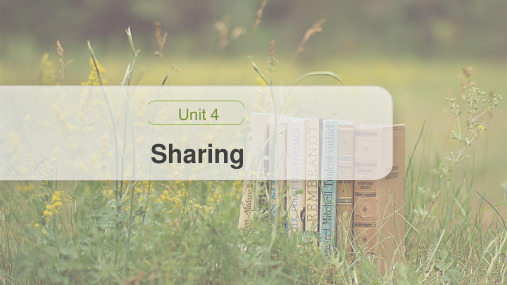
[名师点津] not to mention“更不用说”,相当于一个插入语,但其后所接 的词的形式要求与前面的词平行一致,一般用于否定句之后。表达“更不用 说”的短语还有:①let alone ②not to speak of。
Sometimes I wonder how relevant chemistry is to these students—few
(1)I’ve heard that,in the Sahara,there is no shade during the day,and the stars seem especially brilliant on clear nights. 我听说在撒哈拉,白天没有阴凉之处,在晴朗的夜晚星星看起来格外灿烂。 (2)Water is usually warmer in direct sunlight than in the shade . 水通常是在阳光直射的地方比在阴凉处温度高。 (3)Its long branches and leaves shade them from/against the sun. 它长长的树枝和树叶为他们遮挡了阳光。 (4)I saw that merchant sitting under the shade of a tree,reading a book. 我看见那个商人坐在树荫下读书。
Unit 4
Sharing
内容索引 Period Two Reading and Thinking—Language Points
1. parcel
2. jam 3. mail
4. clay 5. weed
基 础 自 测 自主学习 落实基础知识
n.包裹 vt.裹好;打包 n.果酱;堵塞 n.邮件;信件;邮政 vt.邮寄;发电邮给 n.黏土;陶土 n.杂草;野草 vt.& vi.除杂草
Unit 4 Reading and Thinking高中英语人教版(2019)选择性必修第一册
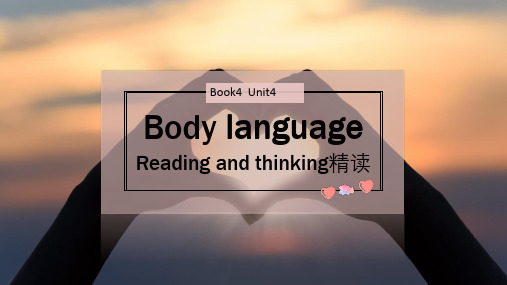
Body language
Reading and thinking精读
Learning Objectives
1.To learn some important language points 2. To anlyse difficult and important sentences propely. 3. To use some important points in senteces.
即学即用 单句语法填空
1. They discussed _v_a_r_i_o_u_s___(vary) matters all over the world.
2. Many graduates seek employment in engineering , aviation,
education, medicine and a wide __v_a_r_ie_t_y_______(vary) of other
vary /ˈveəri/ vi. (根据情况)变化;改变
vary
_v__a_ri_e_t_y____ n. 变化;多样性;不同种类 _v__a_r_i_o_u_s___ adj. 不同的;各种各样的
___________ 各种各样的;不同种类的
a variety of / varieties of
读一读 细观察 1. In the lab, don’t touch anything without your teachers’ permission.
词性__名__词____ 含义__允__许__,__许__可__ 2. You’re not allowed to park here unless you have a permit.
- 1、下载文档前请自行甄别文档内容的完整性,平台不提供额外的编辑、内容补充、找答案等附加服务。
- 2、"仅部分预览"的文档,不可在线预览部分如存在完整性等问题,可反馈申请退款(可完整预览的文档不适用该条件!)。
- 3、如文档侵犯您的权益,请联系客服反馈,我们会尽快为您处理(人工客服工作时间:9:00-18:30)。
American people are wondering whether the
newlyelected president and his administration will keep the nation safe and defend it terrorist attack in the future. A.to B.on C.against D.with any
Mr.Wang was chosen to represent our school at the
meeting. 王老师被选为去参加会议。 ①This painting represents a hunting scene. 这张油画展现了打猎的情景。 ②He represents himself as an expert. 他自称专家。 ③They represented ④His representation their concerns to authorities.
He was very curious about the people who lived upstairs.
他对住在楼上的人感到好奇。
①The reporter is curious to know whether the official is involved in the case. 这个记者很想知道那位官员是否涉及此案。 ② It's curious that he didn't tell you.
【巩固运用】 用represent的正确形式填空。 1)The red lines on the map represent railway lines. 2)她把自己描绘成世界上最好的母亲。 She represents herself as the kindest mother in the world. 3)They represented their concerns to the authorities.(英译汉) 他们向当局陈述了他们关心的问题。
既不„„也不„„ not…nor… 把„„介绍给„„ introduce…to… 亲吻某人脸颊 做„„的方法 kiss sb. on the cheek the /an approach to doing sth. / the way to do sth.
Stand / sit / live close to… 站/坐/住得靠近„
curious adj. 好奇的,求知的,古怪的
(1) be curious about...
对„„感到好奇
be curious to do sth. 极想做某事 It's curious that... „„很反常,„„真奇怪 (2)curiosity n. 好奇心,求知欲;奇物 from/out of curiosity 出于好奇 meet/satisfy one's curiosity满足某人的好奇心 with curiosity=curiously 好奇地
1 At the meeting they discussed three different _____ to the study of maths.
A. approaches
C. methods
B. means
D. ways
2.
the city center, we saw a stone statue of about 10 meters in height. A. Approaching B. Approached
approach / way / means / method
四者皆有“方式”“方法”“途径”之意,但 approach侧重指待人接物或思考问题的方式; way为一般用语; means指可以得到结果的方法; method指有规律的、有条理的做法。
1)表“做…的方法”时各自的搭配: the approach to (doing) sth. the way to do/of (doing) sth. the means of (doing) sth. the method of (doing) sth. 2) 表“用这种方法”时各自的搭配: with this method in this way by this means
【归纳总结】 1)approach vt./vi. 接近,靠近,建议,要求,着 手处理,开始对付 n. 接近,方法,途径,通道 2)approach sb./sth.接近/靠近某人/某物 3)approach sb. about/for sth. 向某人要求/建议 某事 4)approach sb about doing sth. 建议某人做某事 5)the approach to (doing) sth. 做……的方法/途 径
【归纳总结】represent 1)vt. 代表;描绘;表现,体现,象征;声称, 宣称;说明 2) represent sth 代表某物 3)represent sb as/to be„宣称某人为„„ 4)represent sth to sb 向某人说明某事;向 某人传达某事 5)represent sth/sb as sth/sb 把„„描绘 成„„ 【辨析】 stand for只代表某事物或缩略词。 eg.字母E代表什么? What does the letter “E” stand for?
他们向当局陈述了他们关心的问题。
influenced them to investigate.
他的陈述促使他们去调查。
2. … I saw several young people enter the waiting area looking around curiously. looking around curiously是动词-ing用作状 语,表示伴随状态。 He left off driving a car. He said it angrily, pointing at the notice on the wall.
D. To be approached
C. To approach
3.
Those who suffer from headache will find they get ______ from this medicine. A. relief B. safety C. defense D. shelter
Unit 4 Body language
Useful phrases
student association look around step back in defence dash through on the contrary nod at be likely to in general 学生会 环顾四周 后退 防卫地;戒备地 飞快地穿过 正相反 朝„点头 很可能„;有希望„ 大体上,一般来说,通常
他没有告诉你, 实在反常。
③Just to satisfy my curiosity , how much did you pay for your car?我只是出于好奇, 请问你买这辆车花了多少钱?
1.
______ about wild plants that they decided to make a trip to Madagascar for further research A. so curious the couple was B. So curious were the couple C. How curious the couple were D. The couple was such curious
1.Yesterday,…representing our university’s student association,… represent v.代表,象征;体现,表达;描绘, 声称; 1).The competition attracted over 500 players representing 8 different countries. 2).He represented himself as an expert. 3).Let me try to represent my ideas to you in another way. 4).The King is represented as a hero in the play.
approach 【观察思考】 v. 1) National Day is approaching. 2) She approached the bank for a loan. 3) As you approach the town, you will see the college on the left. n. 1) All the approaches to the airport were blocked by the police. 2) The school has decided to adopt a different approach to discipline.
【巩固运用】 翻译句子 1)随着冬天的临近,天气变得更冷了。 With the approach of winter the weather got colder. 2)学习外语的最好途径是什么? What’s the best approach to learning a foreign language?
4. Tony approached Julia, touched her shoulder and kissed her on the check!
approach v. 接近;靠近; Silently we approached the enemy’s camp.
approach n. 接近;方法;途径;通道 approach to (doing) sth.(做)某事的方法 Snow announced the approach of winter. The lion’s approach drove away the small animals. All approaches to the city were blocked.
